By Leen Randell
Updated: Jul 04, 2024
10 Best Herbal Decoctions For Viral Hepatitis
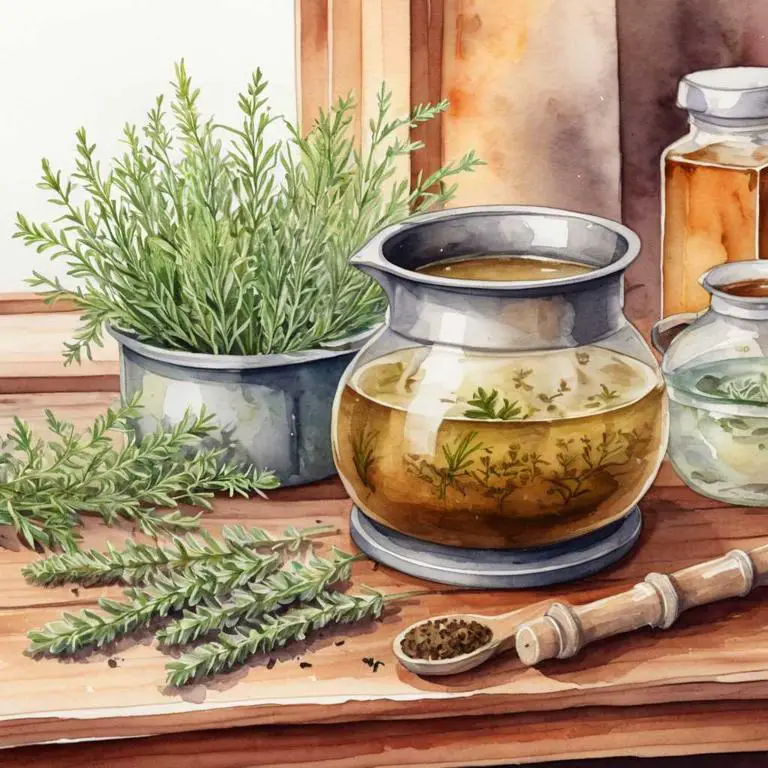
Herbal decoctions for viral hepatitis are concentrated plant-based liquids that have been used for centuries to treat this condition.
These decoctions work by stimulating the liver's natural detoxification processes, reducing inflammation and improving immune function. For example, turmeric and milk thistle decoctions have anti-inflammatory properties that help reduce liver damage, while dandelion root and licorice root decoctions stimulate bile production and improve digestion.
By using these herbal decoctions, individuals with viral hepatitis can experience reduced symptoms, improved overall health, and a better quality of life.
The following article describes in detail the most important decoctions for viral hepatitis, including medicinal properties, parts of herbs to use, and recipes for preparations.
- 1. Silybum marianum
- 2. Taraxacum officinale
- 3. Glycyrrhiza glabra
- 4. Panax ginseng
- 5. Curcuma longa
- 6. Zingiber officinale
- 7. Althaea officinalis
- 8. Boswellia serrata
- 9. Cinnamomum verum
- 10. Matricaria chamomilla
- What is the best combination of herbal decoctions to use for viral hepatitis?
- What ailments similar to viral hepatitis are treated with herbal decoctions?
1. Silybum marianum
Milk thistle decoctions helps with viral hepatitis because they contain silymarin, a flavonoid compound that has been shown to have potent antioxidant and anti-inflammatory properties.
Silymarin is able to penetrate the liver cells and protect them from damage caused by free radicals, thereby reducing inflammation and oxidative stress associated with the disease.
Additionally, silymarin has been found to inhibit the replication of certain viral strains, including hepatitis B and C, which can help to slow or halt the progression of the disease.
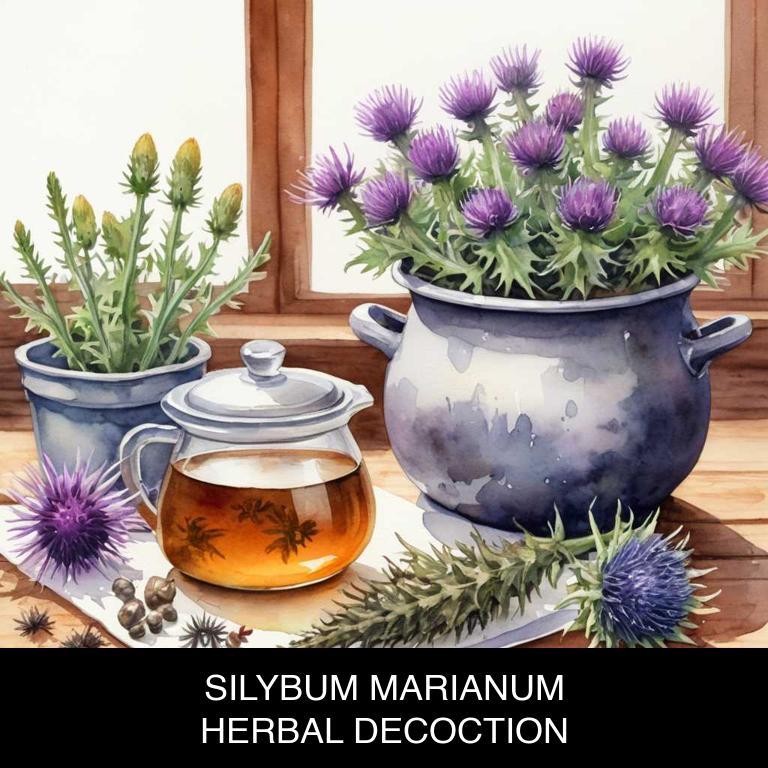
Medicinal Constituents
The list below shows the primary medicinal constituents in Silybum marianum decoctions that help with viral hepatitis.
- Silymarin: Silymarin, a polyphenolic flavonoid complex, helps with viral hepatitis by exerting antioxidant and anti-inflammatory effects, protecting liver cells from damage caused by free radicals and viral infections.
- Isosilybin: Isosilybin, a flavonoid component of silymarin, helps with viral hepatitis by inhibiting viral replication and promoting the recovery of liver function, thereby reducing the severity of liver inflammation.
- Silybin: Silybin, the major component of silymarin, helps with viral hepatitis by improving liver function, reducing oxidative stress, and inhibiting the expression of pro-inflammatory cytokines, which contribute to liver damage and inflammation.
Parts Used
The list below shows the primary parts of milk thistle used to make decoctions for viral hepatitis.
- Seeds: They are the most commonly used part for treating viral hepatitis due to their high concentration of silymarin, a flavonoid complex with hepatoprotective properties.
- Leaves: Leaves are also used for making decoctions, as they contain a smaller amount of silymarin compared to the seeds but still exhibit hepatoprotective and anti-inflammatory effects.
- Flowers: Flowers of Silybum marianum can be used to make decoctions, which are believed to have a similar hepatoprotective effect to the seeds and leaves, although the efficacy may be lower.
Quick Recipe
The following recipe gives a procedure to make a basic milk thistle for viral hepatitis.
- Harvest 100g of dried silybum marianum flowers and leaves from a trusted source at 9am.
- Boil 1 liter of water in a saucepan over high heat for 5-7 minutes.
- Add the 100g of silybum marianum mixture to the boiling water and reduce heat to low.
- Simmer the mixture for 10-15 minutes or until the liquid has reduced by half.
- Strain the decoction through a cheesecloth into a clean container and discard the solids.
2. Taraxacum officinale
Dandelion decoctions helps with viral hepatitis because it has been traditionally used to support liver health and stimulate digestion.
The plant's bioactive compounds, such as taraxasterol and sesquiterpenes, have been shown to possess anti-inflammatory and antioxidant properties that may help reduce liver damage caused by the virus. Additionally, dandelion's bitter principles may enhance bile secretion, which can aid in eliminating toxins and promoting overall liver function.
By supporting the liver's natural detoxification processes, dandelion decoctions may help alleviate symptoms of viral hepatitis and promote recovery.

Medicinal Constituents
The list below shows the primary medicinal constituents in Taraxacum officinale decoctions that help with viral hepatitis.
- Taraxasterol: This triterpenoid saponin has been shown to possess hepatoprotective properties, which may help reduce liver inflammation and oxidative stress associated with viral hepatitis.
- Taraxanthone: This flavonoid compound has been found to have anti-inflammatory and antioxidant activities, which may help mitigate liver damage and promote recovery from viral hepatitis.
- Apolactone: This phenolic compound has been reported to possess antioxidant and anti-inflammatory properties, which may help protect the liver from oxidative stress and inflammation caused by viral hepatitis.
Parts Used
The list below shows the primary parts of dandelion used to make decoctions for viral hepatitis.
- Leaves: They are used for their anti-inflammatory and antioxidant properties, which help in reducing liver inflammation and damage caused by viral hepatitis.
- Roots: They are used for their antiviral and immunomodulatory properties, which help in boosting the immune system and reducing the replication of the virus.
- Flowers: They are used for their flavonoid and saponin content, which helps in reducing oxidative stress and inflammation in the liver.
Quick Recipe
The following recipe gives a procedure to make a basic dandelion for viral hepatitis.
- Harvest 1-2 pounds of fresh taraxacum officinale roots in the spring or fall season.
- Chop the roots into small pieces to increase their surface area for infusion.
- Combine the chopped roots with 4 cups of water in a saucepan and bring to a boil.
- Reduce heat to a simmer for 10-15 minutes or until the liquid has reduced by half.
- Strain the decoction through a cheesecloth or fine-mesh sieve into a clean container.
3. Glycyrrhiza glabra
Licorice decoctions helps with viral hepatitis because of its anti-inflammatory properties, which can reduce liver inflammation and fibrosis caused by the virus.
The licorice root has been shown to inhibit the replication of the virus, thereby reducing its ability to damage liver cells. Additionally, licorice decoctions have antioxidant effects that help protect liver cells from further damage.
By addressing inflammation and oxidative stress, licorice decoctions may help alleviate symptoms and promote recovery in individuals with viral hepatitis.

Medicinal Constituents
The list below shows the primary medicinal constituents in Glycyrrhiza glabra decoctions that help with viral hepatitis.
- Liquiritin: This flavonoid glycoside has anti-inflammatory and antioxidant properties, which help alleviate liver inflammation and oxidative stress associated with viral hepatitis.
- Glycyrrhizin: This triterpenoid saponin has potent antiviral and anti-inflammatory effects, which can help suppress viral replication and reduce liver damage caused by viral hepatitis.
- Isoliquiritigenin: This flavanone has immunomodulatory and antioxidant properties, which can help regulate the immune response and reduce oxidative stress, thereby alleviating symptoms of viral hepatitis.
Parts Used
The list below shows the primary parts of licorice used to make decoctions for viral hepatitis.
- Roots: Roots of Glycyrrhiza glabra are used due to their high content of glycyrrhizin, which has anti-inflammatory and antiviral properties.
- Barks: Barks are used for their flavonoid and saponin content, which may help in reducing liver inflammation and promoting liver regeneration.
- Leaves: Leaves are used due to their antioxidant and anti-inflammatory properties, which may help in reducing liver damage and promoting liver health.
Quick Recipe
The following recipe gives a procedure to make a basic licorice for viral hepatitis.
- Gather 10 to 20 grams of dried glycyrrhiza glabra roots and rinse them with cold water.
- Combine the dried roots with 500 milliliters of water in a saucepan and bring to a boil.
- Reduce the heat to a simmer for 5 to 10 minutes or until the liquid has reduced by half.
- Strain the mixture through a cheesecloth or a fine-mesh sieve into a bowl.
- Allow the decoction to cool and then store it in an airtight container in the refrigerator.
4. Panax ginseng
Ginseng decoctions helps with viral hepatitis because of its potent anti-inflammatory and antiviral properties.
The decoction's bioactive compounds, such as ginsenosides and saponins, have been shown to inhibit the replication of hepatitis viruses, reducing inflammation in the liver and promoting a healthy immune response. Additionally, ginseng's antioxidant capabilities help protect liver cells from oxidative damage, supporting the body's natural defense against viral infections.
This combination of properties makes ginseng decoctions a valuable complementary therapy for managing viral hepatitis symptoms and promoting liver health.
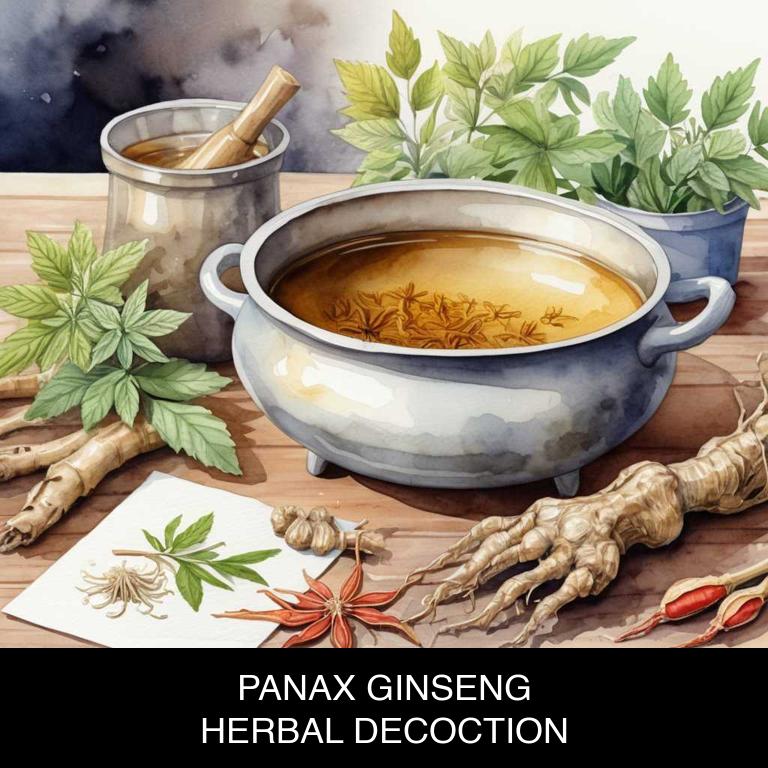
Medicinal Constituents
The list below shows the primary medicinal constituents in Panax ginseng decoctions that help with viral hepatitis.
- Ginsenosides: These triterpenoid saponins help mitigate liver inflammation and oxidative stress associated with viral hepatitis, thereby promoting liver cell recovery and regeneration.
- Ligustilide: This sesquiterpene has been found to exhibit anti-inflammatory and immunomodulatory effects, which may aid in reducing liver damage and improving immune responses in viral hepatitis patients.
- Ginsenolic acid: This phenolic acid has antioxidant and anti-inflammatory properties, which can help protect liver cells from oxidative damage and inflammation caused by viral hepatitis, ultimately promoting liver health.
Parts Used
The list below shows the primary parts of ginseng used to make decoctions for viral hepatitis.
- Roots: They are the primary part used due to their high concentration of bioactive compounds, including ginsenosides, which are believed to have anti-inflammatory and antiviral properties.
- Rhyzomes: They are used in conjunction with roots, as they also contain ginsenosides and other bioactive compounds that may help alleviate symptoms of viral hepatitis.
- Leaves: Leaves are used in some traditional decoctions, as they are believed to have antioxidant properties that may help protect the liver from damage caused by viral hepatitis.
Quick Recipe
The following recipe gives a procedure to make a basic ginseng for viral hepatitis.
- Weigh 5-9 grams of dried panax ginseng roots for a standard decoction dosage.
- Slice the roots into thin pieces to increase surface area for efficient extraction.
- Combine the sliced roots with 1 liter of cold water in a pot for decoction.
- Boil the mixture for 30 minutes to 1 hour to extract active compounds from the roots.
- Strain the decoction through a cheesecloth or fine-mesh sieve to remove the root particles.
5. Curcuma longa
Turmeric decoctions helps with viral hepatitis because of its potent anti-inflammatory and antioxidant properties.
The curcumin present in turmeric has been shown to reduce liver inflammation, oxidative stress, and fibrosis, which are common complications associated with viral hepatitis.
Additionally, curcumin's immunomodulatory effects help to stimulate the body's natural defenses against viral infections, thereby enhancing its ability to fight off the virus and promote recovery.
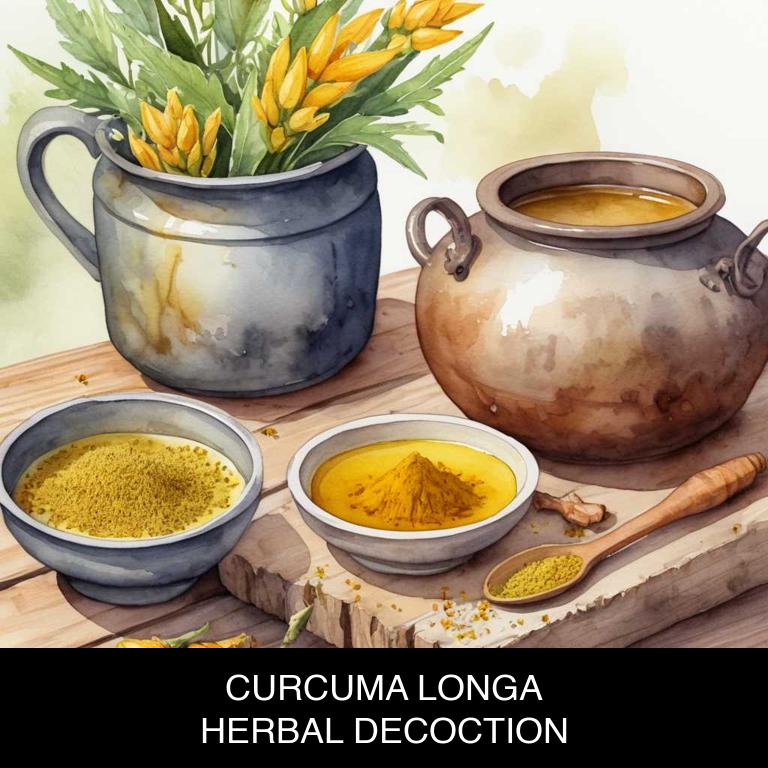
Medicinal Constituents
The list below shows the primary medicinal constituents in Curcuma longa decoctions that help with viral hepatitis.
- Curcumin: This polyphenolic compound has potent antiviral and anti-inflammatory properties, helping to reduce liver inflammation and oxidative stress associated with viral hepatitis.
- Demethoxycurcumin: DMC has been shown to inhibit the replication of hepatitis B virus (HBV) by interfering with viral DNA synthesis, thereby reducing liver damage.
- Turmerones: Turmerones, a type of sesquiterpene, have been found to exhibit antioxidant and anti-inflammatory effects, which can help mitigate liver damage and promote liver regeneration in cases of viral hepatitis.
Parts Used
The list below shows the primary parts of turmeric used to make decoctions for viral hepatitis.
- Rhyzomes: Curcuma longa's rhyzomes are commonly used to make decoctions for viral hepatitis due to their high concentration of curcumin, which has anti-inflammatory and antioxidant properties.
- Roots: The roots of Curcuma longa are used for decoctions due to their ability to stimulate the immune system and reduce liver inflammation.
- Leaves: The leaves of Curcuma longa are used in decoctions to help alleviate symptoms of viral hepatitis, such as fever and fatigue, due to their cooling and soothing properties.
Quick Recipe
The following recipe gives a procedure to make a basic turmeric for viral hepatitis.
- Dry 2-3 grams of dried curcuma longa rhizomes in a low-temperature oven at 150 degrees fahrenheit for 2 hours.
- Grind the dried curcuma longa rhizomes into a fine powder using a mortar and pestle.
- Combine 1-2 teaspoons of the ground curcuma longa powder with 250 milliliters of boiling water in a saucepan.
- Boil the mixture for 5-7 minutes then reduce heat to a simmer for an additional 10 minutes.
- Strain the decoction through a cheesecloth or a fine-mesh sieve into a clean glass container.
6. Zingiber officinale
Ginger decoctions helps with viral hepatitis because of its potent anti-inflammatory and antioxidant properties.
The active compounds in ginger, such as gingerol and shogaol, have been shown to inhibit the replication of hepatitis viruses, reducing liver inflammation and damage. Additionally, ginger's ability to increase gastric motility and stimulate bile production can help eliminate toxins from the body, further supporting the healing process.
By incorporating herbal ginger decoctions into their treatment plan, individuals with viral hepatitis may experience relief from symptoms and improved overall health outcomes.
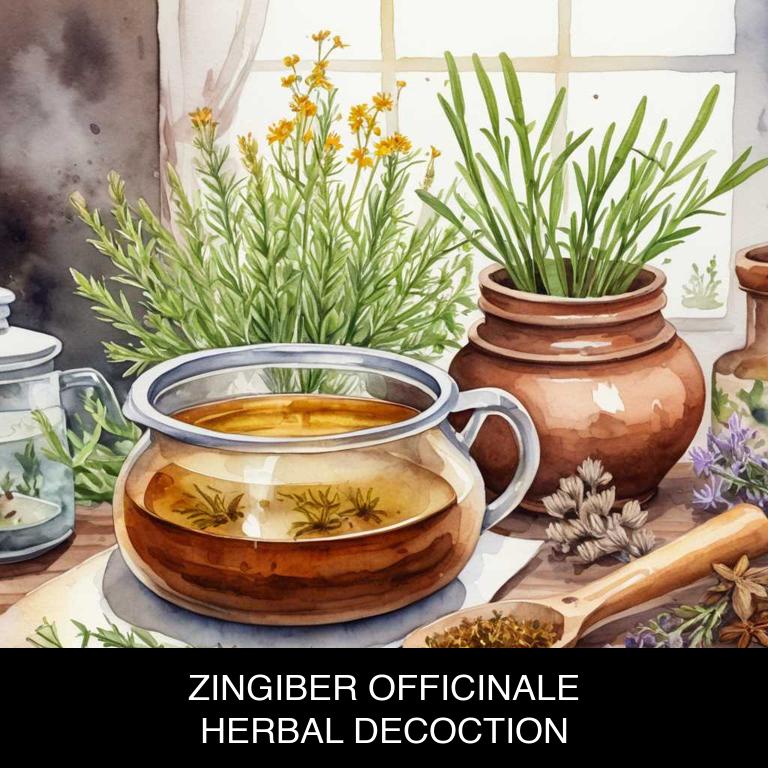
Medicinal Constituents
The list below shows the primary medicinal constituents in Zingiber officinale decoctions that help with viral hepatitis.
- Gingerols: Gingerols, specifically [6]-gingerol, have been shown to exhibit anti-inflammatory properties, which may help reduce liver inflammation and oxidative stress associated with viral hepatitis.
- Shogaols: Shogaols, particularly [6]-shogaol, have been found to possess antioxidant and anti-inflammatory activities, which may help protect liver cells from damage and promote recovery in cases of viral hepatitis.
- Curcuminoids: Although not exclusive to Zingiber officinale, curcuminoids present in ginger may also contribute to the decoction's hepatoprotective effects, as they have been shown to possess anti-inflammatory, antioxidant, and antiviral properties that may help alleviate symptoms of viral hepatitis.
Parts Used
The list below shows the primary parts of ginger used to make decoctions for viral hepatitis.
- Buds: The buds are another commonly used part, as they are rich in antioxidants and have anti-inflammatory properties that help to protect the liver from damage caused by viral hepatitis.
Quick Recipe
The following recipe gives a procedure to make a basic ginger for viral hepatitis.
- Gather 1 tablespoon of dried zingiber officinale rhizomes and 2 cups of water for decoction preparation.
- Crush the dried zingiber officinale rhizomes into fine pieces to increase their surface area for extraction.
- Combine the crushed zingiber officinale with 2 cups of water in a saucepan and heat over medium heat.
- Bring the mixture to a boil then reduce heat to low and simmer for 10-15 minutes.
- Strain the decoction through a cheesecloth or a fine-mesh sieve into a clean container for consumption.
7. Althaea officinalis
Marshmallow decoctions helps with viral hepatitis because they have anti-inflammatory, antioxidant, and immunomodulatory properties that can alleviate symptoms of liver inflammation and damage.
The saponins in marshmallow root, for example, can reduce oxidative stress and scarring in the liver, while also enhancing the body's natural defenses against viral infections.
Additionally, marshmallow decoctions may help to soothe digestive issues and improve nutrient absorption, further supporting liver health during viral hepatitis treatment.
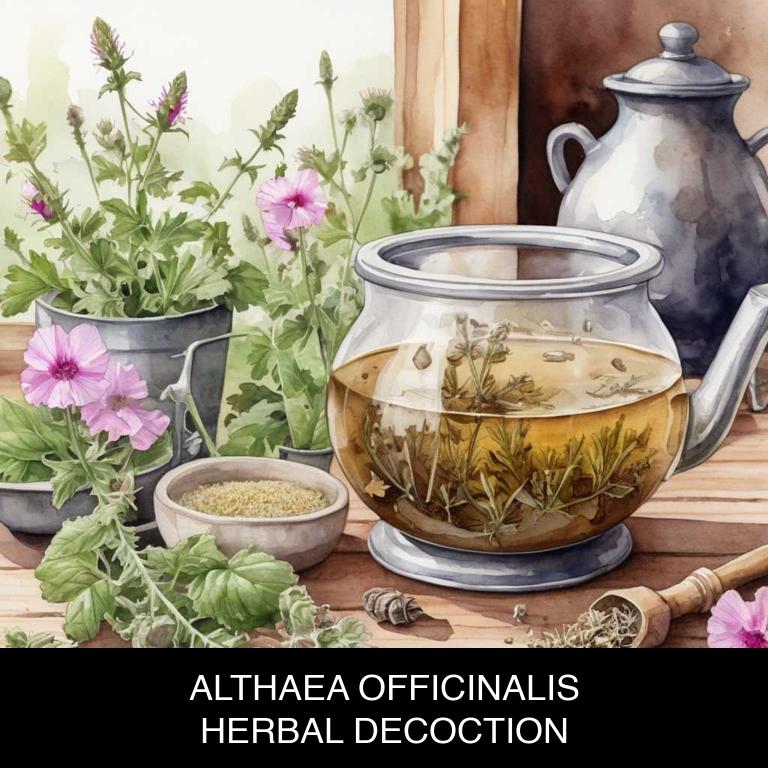
Medicinal Constituents
The list below shows the primary medicinal constituents in Althaea officinalis decoctions that help with viral hepatitis.
- Mucilages: Mucilages in Althaea officinalis decoctions help soothe liver inflammation and protect the liver from oxidative damage caused by viral hepatitis, promoting a faster recovery.
- Flavonoids: Flavonoids present in the decoctions possess anti-inflammatory and antioxidant properties that reduce liver inflammation, neutralize free radicals, and help modulate the immune response in viral hepatitis.
- Glycosides: Glycosides, specifically inulin and mucilages, help to stimulate liver cell regeneration and protect the liver from oxidative stress caused by viral hepatitis, thereby promoting liver function recovery.
Parts Used
The list below shows the primary parts of marshmallow used to make decoctions for viral hepatitis.
- Roots: The roots of Althaea officinalis are used to make decoctions for viral hepatitis due to their high mucilage content, which helps to soothe and protect the liver.
- Leaves: The leaves of Althaea officinalis are used to make decoctions for viral hepatitis due to their antioxidant properties, which help to reduce oxidative stress and inflammation in the liver.
- Barks: The barks of Althaea officinalis are used to make decoctions for viral hepatitis due to their anti-inflammatory properties, which help to reduce liver inflammation and promote healing.
Quick Recipe
The following recipe gives a procedure to make a basic marshmallow for viral hepatitis.
- Gather 1-2 teaspoons of dried roots of althaea officinalis for decoction preparation.
- Combine the dried roots with 1 quart of boiling water in a saucepan.
- Simmer the mixture for 10-15 minutes to allow roots to fully infuse.
- Strain the mixture through a cheesecloth or fine-mesh sieve to remove roots.
- Allow the decoction to cool and store it in a glass container for later use.
8. Boswellia serrata
Frankincense decoctions helps with viral hepatitis because of its potent anti-inflammatory and antioxidant properties.
The boswellic acids present in frankincense have been shown to reduce liver inflammation and fibrosis, which are common complications of viral hepatitis. Additionally, frankincense's ability to inhibit viral replication and enhance immune function can help combat the virus directly.
By reducing oxidative stress and promoting cellular health, frankincense decoctions may also help alleviate symptoms such as fatigue and joint pain commonly associated with viral hepatitis.
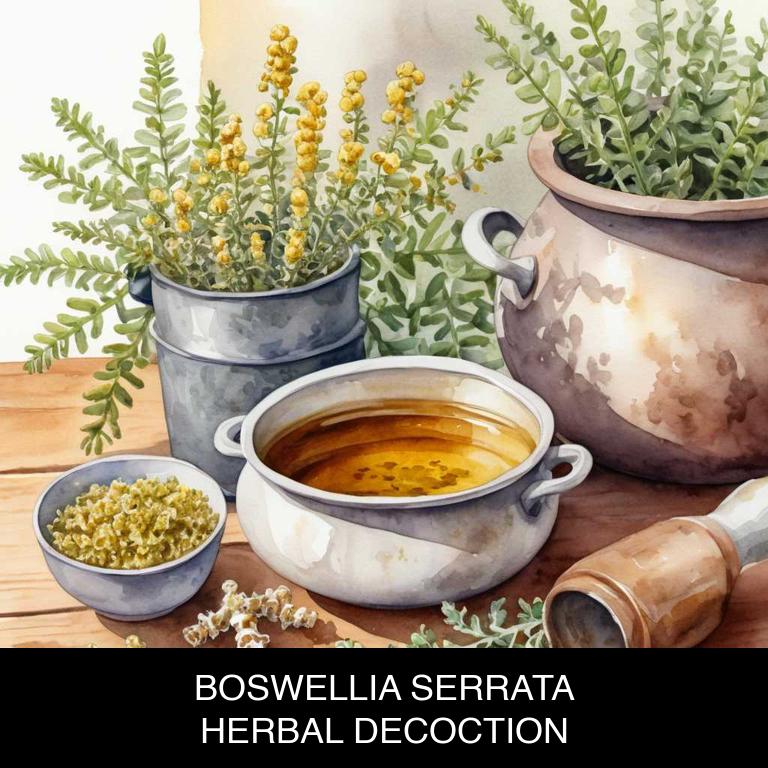
Medicinal Constituents
The list below shows the primary medicinal constituents in Boswellia serrata decoctions that help with viral hepatitis.
- Acetyl-11-keto-β-boswellic acid: AKBA exhibits anti-inflammatory and antioxidant properties, which can help reduce liver damage and inflammation associated with viral hepatitis.
- Β-boswellic acids: BAs have been shown to possess anti-inflammatory and antiviral activities, which can help combat the replication of the hepatitis virus and reduce liver inflammation.
- Terpinene: Terpinene is an antimicrobial terpene that has been found to exhibit antiviral properties, which can help prevent the replication of the hepatitis virus and reduce liver damage.
Parts Used
The list below shows the primary parts of frankincense used to make decoctions for viral hepatitis.
- Roots: They are used due to their high content of boswellic acids, which have anti-inflammatory and antiviral properties.
- Rhyzomes: They are used due to their ability to modulate the immune system and reduce inflammation in the liver.
- Barks: They are used due to their antioxidant properties, which help protect the liver from oxidative stress and damage caused by viral hepatitis.
Quick Recipe
The following recipe gives a procedure to make a basic frankincense for viral hepatitis.
- Measure 500 milligrams of dried boswellia serrata bark and place it in a medium-sized saucepan.
- Combine the boswellia serrata with 2 liters of water and bring to a boil over high heat.
- Reduce the heat to a simmer and let the mixture steep for 5 to 7 minutes.
- Strain the decoction through a cheesecloth or fine-mesh sieve into a clean glass container.
- Discard the solids and allow the decoction to cool to room temperature before refrigerating it.
9. Cinnamomum verum
Ceylon cinnamon decoctions helps with viral hepatitis because of its potent antioxidant and anti-inflammatory properties.
The decoction's active compounds, such as cinnamaldehyde and eugenol, have been shown to inhibit the replication of viral particles, reducing inflammation and oxidative stress in the liver. Additionally, Ceylon cinnamon has been found to enhance immune function, promoting a healthy response to viral infections.
By incorporating Ceylon cinnamon decoctions into their treatment regimen, individuals with viral hepatitis may experience improved symptoms and reduced disease progression.
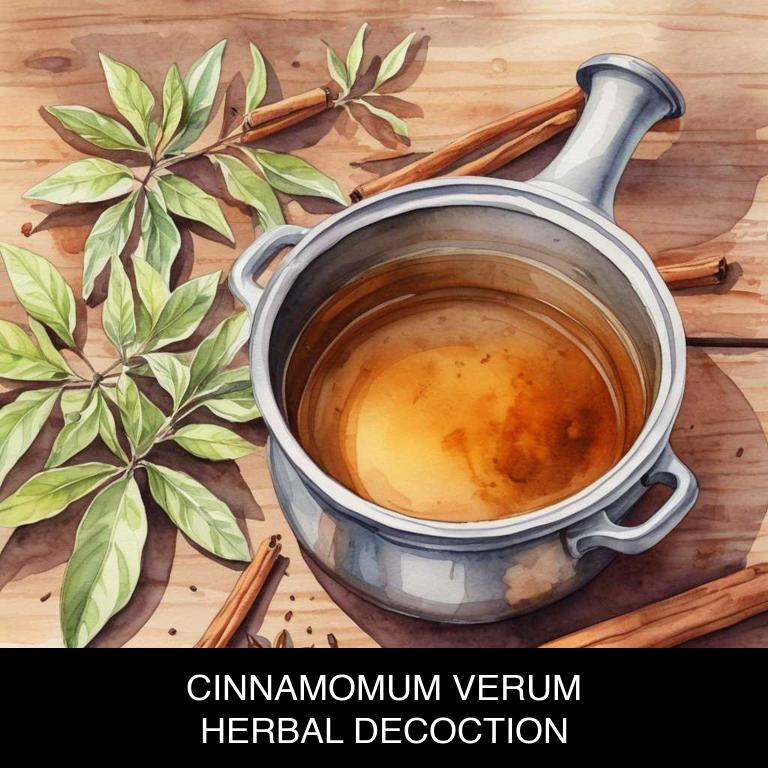
Medicinal Constituents
The list below shows the primary medicinal constituents in Cinnamomum verum decoctions that help with viral hepatitis.
- Cinnamaldehyde: This terpene has been shown to exhibit antiviral properties against hepatitis B virus (HBV) by inhibiting viral replication and inducing apoptosis in infected cells.
- Eugenol: A phenolic compound, eugenol has been found to exhibit potent antiviral activity against HBV by inhibiting viral DNA polymerase and preventing viral replication.
- Linalool: This terpene has been reported to exhibit antioxidant and anti-inflammatory properties, which may help in reducing liver damage and inflammation associated with viral hepatitis.
Parts Used
The list below shows the primary parts of ceylon cinnamon used to make decoctions for viral hepatitis.
- Leaves: They are often employed in decoctions for their antioxidant and anti-inflammatory properties, which may help alleviate liver damage.
- Rhyzomes: The rhyzomes contain compounds that exhibit antiviral and anti-inflammatory activities, making them useful in treating viral hepatitis.
Quick Recipe
The following recipe gives a procedure to make a basic ceylon cinnamon for viral hepatitis.
- Harvest 10-15 grams of cinnamomum verum bark from mature trees for future use.
- Dry the harvested bark in a well-ventilated area for 2-3 days to reduce moisture.
- Grind the dried bark into a fine powder using a mortar and pestle or a coffee grinder.
- Combine 2-3 grams of the ground cinnamomum verum powder with 250ml of boiling water in a teapot.
- Steep the mixture for 5-7 minutes and then strain the liquid before serving.
10. Matricaria chamomilla
Chamomile decoctions helps with viral hepatitis because of its anti-inflammatory and antioxidant properties, which help to reduce liver inflammation and damage caused by the virus.
The apigenin present in chamomile also has antiviral effects, inhibiting the replication of the virus and reducing the severity of symptoms. Additionally, chamomile's calming properties can help alleviate stress and anxiety associated with viral hepatitis, promoting overall well-being and immune system function.
By incorporating chamomile into a treatment plan, individuals with viral hepatitis may experience improved liver health and reduced symptom severity.
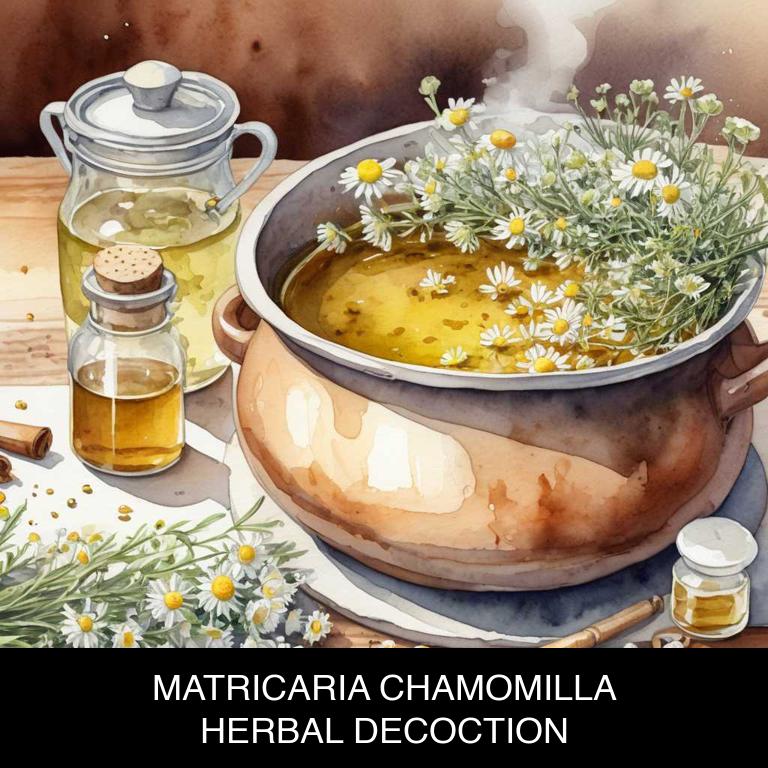
Medicinal Constituents
The list below shows the primary medicinal constituents in Matricaria chamomilla decoctions that help with viral hepatitis.
- Apigenin: This flavonoid acts as an antiviral agent, inhibiting the replication of viral particles and thus helping to reduce the severity of viral hepatitis.
- Luteolin: As a flavonoid with anti-inflammatory properties, luteolin helps to reduce liver inflammation and oxidative stress associated with viral hepatitis.
- Chamazulene: This sesquiterpene lactone exhibits antioxidant and anti-inflammatory activities, protecting liver cells from oxidative damage and promoting the healing of liver tissue in viral hepatitis patients.
Parts Used
The list below shows the primary parts of chamomile used to make decoctions for viral hepatitis.
- Flowers: They are the most commonly used part due to their high content of apigenin, an active compound that has been shown to have antiviral properties.
- Leaves: The leaves of Matricaria chamomilla contain flavonoids and terpenoids, which have been found to exhibit antiviral and anti-inflammatory effects, making them useful in treating viral hepatitis.
- Roots: The roots of the plant contain sesquiterpenes, which have been shown to have antiviral and immunomodulatory effects, helping to boost the body's immune system and fight off viral infections.
Quick Recipe
The following recipe gives a procedure to make a basic chamomile for viral hepatitis.
- Gather 2-3 teaspoons of dried flowers of matricaria chamomilla for a decoction.
- Combine the dried flowers with 8 ounces of boiling water in a heat-resistant glass container.
- Reduce heat to medium and simmer the mixture for 10-15 minutes or until it has reduced slightly.
- Strain the decoction through a cheesecloth or fine-mesh sieve into a separate container.
- Discard the solids and let the decoction cool to room temperature before consumption.
What is the best combination of herbal decoctions to use for viral hepatitis?
The best combination of herbal decoctions that help with viral hepatitis is a blend of Milk Thistle (Silybum marianum), Dandelion Root (Taraxacum officinale), and Licorice Root (Glycyrrhiza glabra).
Milk Thistle's silymarin helps protect liver cells, while Dandelion Root aids in liver detoxification and regeneration. Licorice Root's anti-inflammatory properties reduce liver inflammation and promote healing. This synergistic combination may help alleviate symptoms, improve liver function, and support the body's natural healing process.
However, consult a healthcare professional before using any herbal remedies.
What ailments similar to viral hepatitis are treated with herbal decoctions?
Ailments similar to viral hepatitis that are treated with herbal decoctions are various liver and gallbladder disorders, such as jaundice, liver cirrhosis, and cholecystitis.
Herbs like milk thistle, turmeric, and barberry are used to create decoctions that stimulate bile production, reduce inflammation, and improve liver function.
These decoctions also help to detoxify the body and promote overall digestive health.